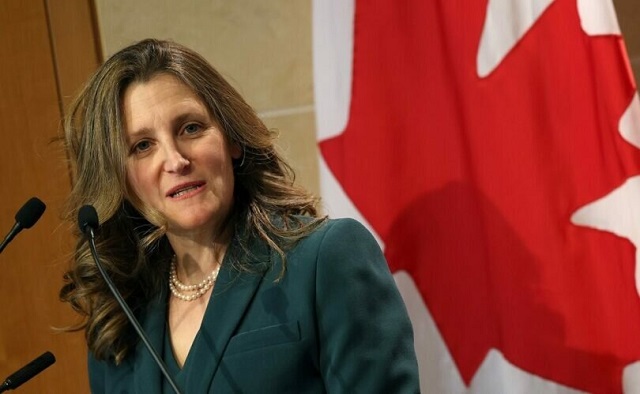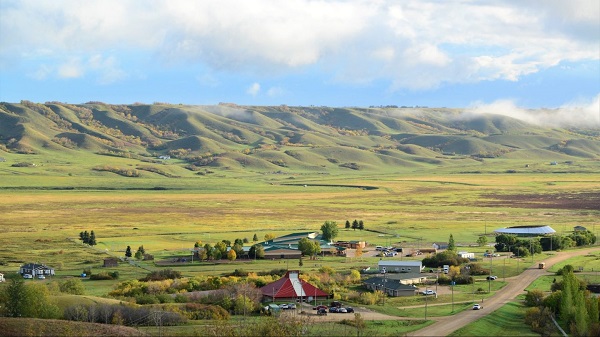Economy
Deputy PM Chrystia Freeland irks Canadian senators with request to pass budget bill sight unseen

From LifeSiteNews
One senator called it ‘an embarrassment’ to be asked to vote on a bill without reading it.
Many Canadian senators were furious after Finance Minister and Deputy Prime Minister Chrystia Freeland asked them to pass the Liberal government’s 2024 budget bill without reading it.
Last Friday, senate managers had asked for approval to spend an additional $8.9 billion without the actual text of the bill being available to view.
Senator Patti LaBoucane-Benson, who serves as the cabinet’s legislative deputy in the Senate, tried to brush off the notion of the cabinet’s failure to publish the bill’s full text, saying it was a “House of Commons problem.”
However, Senator Elizabeth Marshall said, “You need the bill to vote on it,” adding, “I haven’t seen the bill.”
“It’s not posted. I don’t know how we can vote on a bill that we haven’t seen,” the senator said.
Last Thursday, Prime Minister Justin Trudeau’s 2024 budget bill was passed by the House of Commons in less than 10 minutes. It was then sent to the Senate.
Senator Donald Plett said that it was “an embarrassment” to have been asked to vote on a “bill I haven’t seen,” adding, that senators “need to get a copy of the bill so we know what we’re voting on.”
Senator Denise Batters observed that when it comes to having been asked to vote on a bill of which the text was not even made available, “This is not the first time this sort of thing has happened.”
Indeed, in 2020 at the start of the COVID crisis, spending bills were passed using special powers by the Trudeau government without the text ever being made available until after the laws were passed. Trudeau’s cabinet then used the special powers to spend an extra $350 billion by March 31, 2020.
As for Freeland, she has deep connections to the globalist group behind the socialist “Great Reset” agenda headed by Klaus Schwab and the World Economic Forum (WEF).
Freeland, currently serving as a member of the WEF Board of Trustees, attended a WEF meeting in January and participated in a public panel on Ukraine.
The ties between the WEF and the Trudeau Liberals run deep. Schwab once told Freeland that he has “counted” on her to make sure his globalist goals see the light of day.
Business
Will Trump’s ‘Liberation Day’ Tariffs End In Disaster Or Prosperity?


From the Daily Caller News Foundation
By J.D. Foster
“Liberation Day” has come. So what does it mean? Beats the hell out of me.
What we know is that President Trump’s avalanche of tariffs was to hit a peak on April 2; not end, mind you; not necessarily “the” peak, as more could be on the way; but a peak.
No Trump policy more completely breaks with America’s past than his “beautiful” tariffs on just about everything coming into the United States from just about anywhere.
Will this new policy liberate American manufacturing from foreign shackles? Will it usher in a new era of prosperity, keeping in mind the United States had for many years the consistently best-performing economy in the industrialized world, even overcoming the many inane obstacles erected by the Biden-Harris Administration?
Or will it leave the United States isolated, friendless, and weakened?
The correct answer at this point is no one knows, not even the bloviating talking heads on TV confidently predicting demise or Shangri-la.
Think of it this way. Suppose you’re a restaurant chef and a woman hands you a new recipe. Her father turns 75 soon and they want to have a party at the restaurant. The recipe is for the father’s favorite dish, one her mother made for years.
The recipe looks old, with odd ingredients and processes you’ve not seen before. Now judge it as a chef.
You can’t. Even as you start chopping and dicing, mixing ingredients as instructed, you’re not too sure how this is going to turn out. You have to wait until the dish is on the plate and taste it.
That’s the case with Trump’s tariffs. How will this all turn out? It’s too soon to tell.
The stock market sure doesn’t like it, but why should it? The investor class doesn’t understand this any better than you do. What they do understand is this new policy has upended assumptions and created enormous new uncertainties. We know that dish as those ingredients are always good for a big pullback.
Much of the confusion arises because we don’t know the underlying policy and likely this uncertainty is intentional. Trump likes keeping his counterparts, in this case our trading partners, guessing. If it means Americans are confused for a bit, Trump’s cool with that. Breaking eggs to make an omelette. It will pass and America will be great again afterward. Bon appetite.
If the core policy is to erect massive and mostly permanent tariff walls behind which American firms can hide, then we know how this will turn out: America, meet the dustbin of history.
If the core policy is to force our trading partners to deal with America fairly by reducing their trade barriers after which Trump will remove his tariffs, then this could turn out very well. Tariffs (and non-tariff barriers) in the U.S. and those of our trading partners would fall, reinvigorating the free trade that has energized prosperity for decades.
Which is it? Walls and doom or freedom and prosperity? Again, too early to tell.
Whatever else Trump does in his second term, these tariffs will define his presidency, akin in consequence to Ronald Reagan’s pro-growth tax cuts and Joe Biden’s inflation.
Trump in his second term clearly lives by the saying, “go bold or go home.” He’s got “bold” down pat. We will see over the next year or so whether he and the Republicans go home. Has he liberated Democrats from any fear of Republicans in the mid-terms or in 2028, or he’s liberated America from any fear of Democratic socialism and wokism returning in our lifetimes. The chips are all-in. Soon we will see the cards. Uncertainty, indeed.
JD Foster is the former chief economist at the Office of Management and Budget and former chief economist and senior vice president at the U.S. Chamber of Commerce. He now resides in relative freedom in the hills of Idaho.
2025 Federal Election
Mark Carney is trying to market globalism as a ‘Canadian value.’ Will it work?

From LifeSiteNews
By Frank Wright
A campaign to appeal to national sentiment is a strange gambit for Liberals – committed as they are to the replacement of the nation with globalist policies.
The storm over Donald Trump’s threatened tariffs over the Canadian border crisis has been baked into a vote-winning meme by Canada’s Liberal Party. Yet with an election only weeks away on April 28, can a sentimental appeal to a vanished Canada secure a win for Mark Carney?
Trump’s tariffs were expected to hit Canada on Wednesday’s “Liberation Day,” refueling a furor over Canadian sovereignty which has led some to say this is “shaping up to be the trade war election.”
Responding to the tariffs, which ultimately never came to fruition in the way the Liberals were warning, a meme war broke out with Carney responding to harsh reality with a feelgood slogan.
Elbows up, Canada. pic.twitter.com/0gJ2opnPjZ
— Mark Carney (@MarkJCarney) March 22, 2025
“Elbows up!” is the new Current Thing in Canada, a media craze designed to stir nationalist indignation in elderly voters who may even remember the 1950s origin of the phrase.
The elbows refer to those of Gordie Howe – a 1950s hockey legend from Saskatchewan – a conservative province – and from a time when Canada was populated by Canadians.
It bears all the hallmarks of an “astroturf” campaign – intended to look authentic, but in reality a manufactured mass belief for marketing purposes.
“Elbows up” seeks to inspire a fighting mood against the threat – or promise – of tariffs on Canadian trade with the U.S.
Carney will ‘cave’
It is a classic example of the manipulation of popular feeling into political allegiance. How will the feelings of aging voters affect the imposition of tariffs? Not at all. Nor will the Canadian Prime Minister be able to stop them.
Insider reports say that Carney will “quietly cave” to Donald Trump over the issue, if the U.S. president does indeed go forward with them.
Prepare for the Carney ‘cave’ on trade with the USA
Ian Bremmer is the boss of Gerry Butts and Mark Carneys wife’s at Eurasia Group. He just told US decision makers that:
“I expect Ottawa will quietly fold shortly after the vote….”
Ian, sitting daily with Carneys inner… https://t.co/PVQIeUzuFQ
— David Knight Legg (@KnightLegg) March 27, 2025
Silence over ‘devastating’ Chinese tariffs caused by Trudeau
Why? Carney has no alternative. He has already “caved” – to China – over the same issue. “Devastating” Chinese tariffs took effect over a week ago in Canada, as Global News reported:
Canadian agricultural producers are warning of devastating impacts from new Chinese tariffs that began Thursday (March 20th), which they say will compound the economic strain from the U.S. trade war.
The tariffs are severe, and will have a dramatic impact – as China is Canada’s second-largest trading partner behind the United States.
“China has imposed a 100 per cent levy on Canadian canola oil and meal, as well as peas, plus a 25 per cent duty on seafood and pork,” the outlet reported.
These tariffs cannot be corrected by hockey memes, and are a response to tariffs placed on Chinese goods by Liberal Prime Minister Justin Trudeau. The Liberal Party – seeking election over outrage on tariffs – has created a tariff crisis, whose costs will be borne by the people who vote for them.
There are no “elbows up” against China. In fact, their tariffs have been greeted with silence from Carney, who has said U.S.-Canada relations are at an end.
Corruption, drug cartels in Canada
Anger at Donald Trump obscures the serious problems which prompted his suggestion that Canada could be absorbed into the United States. “Elbows Up” is a cool way of making Canadians look past the fact that the crisis they inhabit has been created by the Liberals and their globalist agenda.
On February 1, Trump issued an executive order “Imposing duties to address the flow of illicit drugs across our northern border.”
Terry Glavin, writing in January for Canada’s National Post, dismissed Trump’s earlier claims of a crisis over Canadian “border security and drug trafficking” as a “pretext” for his “…declared objective of exerting ‘economic force’ to annex Canada as the 51st American state.”
Yet this too appears to be a fantasy inspired by national sentiment – which simply ignores reality.
As LifeSiteNews reported, Canada’s second bank has laundered over 18 trillion dollars in the U.S. and Canada for Mexican and Chinese drug cartels. The world’s largest fentanyl factory was discovered in Vancouver in February.
Canada a ‘failed state’?
The serious issue of corruption by Chinese Triads combines with a picture of impotent Canadian law and border enforcement to suggest that Canada may be, as Glavin warned, “approaching failed-state status.” When the memes wear off, this is the reality faced by Canadian voters.
Canadians have complained since 2017 that life is too expensive to have a family.
Now “a generation” cannot afford a home, and many struggle to pay for groceries. Help is at hand, however.
Their Liberal government supports Medical Assistance in Dying (MAID) – killing the elderly, poor and ill as healthcare – whilst promoting radical “gender” ideology to help sterilize children.
Will Carney come to the rescue?
Carney is a committed “Net Zero” fanatic, and is the kind of “Catholic” who fervently supports abortion.
His moral integrity is demonstrated further by the fact that his $25 billion “green” investment fund was located in Bermuda to dodge Canadian taxes.
As the Canadian Catholic Register cautions, “[Carney] is a well-connected globalist with deep ties to institutions such as the World Economic Forum, the United Nations, Bank for International Settlements, and the Financial Stability Board.”
Globalist ‘Canadian’ values
National identity is a strange appeal to make on behalf of a party which appears to be working hard to replace Canadians with immigrants, and which is now lead by a globalist technocrat.
It is the values of globalism, of course, which are presented to voters as “Canadian values”: open borders, LGBTQ “rights,” “gender” surgery and hormones for children, and the Net Zero deindustrialization program strongly supported by the Liberal leader Mark Carney.
How long can this appeal to save the nation of Canada from foreign influence convince Canadians to vote for more of the same? The Liberal Party has led Canada into crisis, presiding over corruption so severe that its police, judicial and border authorities are deemed incapable of being trusted by the USA.
This is not a charge made solely by the Trump administration, but also under Biden – with Antony Blinken pressing the matter of the insecurity of the Canadian border as far back as 2022. In the coming weeks, the real issues which have consigned Canada to a fond memory may well shrink the Liberal lead reported by the polls.
What do the polls say?
With some headlines trumpeting an “eight point lead” for the Liberals, others show a narrower advantage for the globalist Carney – and one leading firm has them tied with the Conservatives.
Abacus Data’s March 30 poll had both parties neck and neck at 39%. Abacus, who describe themselves as “Canada’s most sought-after, influential, and impactful polling firm,” “…were one of the most accurate pollsters conducting research during the 2021 Canadian election.”
A second poll shows a narrower lead, and a clear bonus for Carney for simply not being Justin Trudeau.
338 Canada showed a four point lead for the Liberals on March 31, and its graph clearly illustrates that their lead relies on disaffected NDP voters – and the collapse of the Bloc Quebecois vote.
Reality enters the chat
With the issues at home now overtaking Trump and his tariffs, the cost of living and those allied to mass migration such as housing are returning to the forefront of voters’ minds. The issue of reality – and who is the real Mark Carney – may well overtake the fake nationalism of “Elbows up.”
A campaign to appeal to national sentiment is a strange gambit for Liberals – committed as they are to the replacement of the nation with globalist policies – and of its people through mass immigration. Carney has been powerless to halt Chinese tariffs. He is powerless to halt those of Donald Trump.
If Canadians can see beyond cringe hockey memes these two issues are clearly a reaction to the actions and inaction of a Liberal-led Canada. This is the reason that Conservative leader Pierre Poilievre is campaigning on the harm done to Canadians by the “lost Liberal decade.” If Canadians can be persuaded by the argument presented by reality, it seems unlikely they will vote for another – whatever the polls may say.
-

 Business2 days ago
Business2 days agoB.C. Credit Downgrade Signals Deepening Fiscal Trouble
-

 Canadian Energy Centre2 days ago
Canadian Energy Centre2 days agoSaskatchewan Indigenous leaders urging need for access to natural gas
-

 2025 Federal Election2 days ago
2025 Federal Election2 days agoHighly touted policies the Liberal government didn’t actually implement
-

 Freedom Convoy2 days ago
Freedom Convoy2 days agoFreedom Convoy leaders Tamara Lich, Chris Barber found guilty of mischief
-

 COVID-192 days ago
COVID-192 days agoTrump’s new NIH head fires top Fauci allies and COVID shot promoters, including Fauci’s wife
-

 2025 Federal Election1 day ago
2025 Federal Election1 day agoWill Four More Years Of Liberals Prove The West’s Tipping Point?
-

 Courageous Discourse2 days ago
Courageous Discourse2 days agoEurope Had 127,350 Cases of Measles in 2024
-

 Crime2 days ago
Crime2 days agoEuropol takes out one of the largest pedophile networks in the world with almost 2 million users





